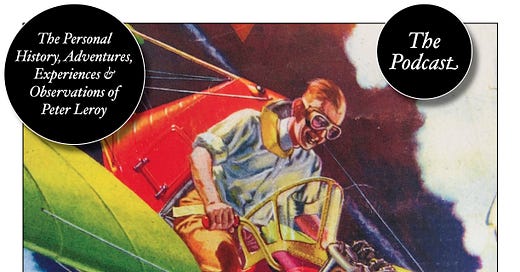10
LARRY’S SISTER, Lucinda, was as cute as a button and smart as a whip. She and Larry loved trading wisecracks; in fact, I realize, reflecting on the Peterses now and bringing to mind my feelings toward them when I was a boy, that the wisecracking and playful teasing among them was meant to serve as a sign of the love they felt for one another, something I didn’t understand at the time. To me then, it seemed no more than a part of their exciting and unpredictable style, but even if I considered it no more than an element of style, the wisecracking was one of those constants of the Peters household that persisted beyond the adventures, and was therefore one of the truly valuable aspects of the books and of life in the Peters family. There was little wisecracking in my family, and I came to think that there would be a good deal more fun and immeasurably more panache if only there were more wisecracking. The Peterses’ wisecracking seemed to be one of the few things that I might translate from Larry’s life into mine.
“Peter,” said my father one morning while I was musing along the foregoing lines, “would you bring me an ashtray?”
“Ash and ye shall reshieve,” I said.
My father gave me a pained look, and I came quickly to the conclusion that there are, essentially, two kinds of families, wisecracking families and nonwisecracking families, and that it had been my unfortunate lot to be born into one of the latter.
Whenever Lucinda entered a scene, I began to smile as I read, for I knew that something interesting was going to happen. She was a year younger than Larry, but since girls mature more quickly than boys, she easily held her own in their amiable tussles, both verbal and physical. (The ages of the characters in the Larry Peters adventures were never given. The only references to age that I can recall were relative: we were told somewhere in one of the early books that Lucinda was a year younger than Larry and that Rocky was three years older. After considerable reading in the literature, I’ve concluded that Lucinda and Larry, given the different rates at which they matured, were both somewhere in late-early to early-middle adolescence and that Rocky was just postadolescent. I could be wrong.)
Lucinda’s character was wildly variable. She’d act like one of the guys at one time, grow shy and retiring at another, become brazen and sarcastic, headstrong, cautious, and who-knows-what-all by turns. Her appearance was never described in full, and even the fragments that the reader was given now and then, glimpses, as it were, through a curtain parted by a puff of a summer night’s breeze, were vague, more tantalizing than satisfying. This vagueness was, I concluded, deliberate and wise, since the reader was, thanks to the lack of details about her appearance, allowed, even encouraged, to construct his own Lucinda from bits and pieces of girls he knew, or a girl he had merely glimpsed—at the beach, say, dropping a strap of her bathing suit down over her arm, rubbing sun-tan lotion onto her shoulder absentmindedly while she stared out across the surf toward the shimmering horizon, or stretched out on the foredeck of a lean blue sloop, wearing red-rimmed reflective sunglasses, reading a paperback book the title of which one could not make out, or perhaps perched with a group of friends on the varnished handrail atop the railing that ran along the boardwalk, raising her right leg to scratch, just at the edge of the line imprinted by the elastic of her bathing suit, the irregular red welt of a horsefly bite—for these books were in one respect truly masterly pieces of work: they provided a context for the fantasies of adolescent boys, a context so reassuring that the timidity and fear that ordinarily attended those fantasies nearly disappeared when they were entertained within it. One’s parents and other adults, who seemed at times to be regarding one with lancet eyes, eyes that penetrated straight to that abscess where one’s guilty urges maturated, did not go to Kittiwake Island.
If the bond between Larry and Rocky became for me the paradigm of friendship, and it did, what existed between Larry and Lucy made me wish for that special relationship that can exist only between a brother and sister. What is it that makes that relationship what it is? It is, I suppose, partly narcissistic. Here is an interlocutor who understands all your references, who shares your habits of speech, who even sounds a bit like you. Here is a girl who reminds you of yourself. Here is your companion, if your ages are close, as Lucy’s and Larry’s were, in growing up. I didn’t have to envy Larry for his having Rocky, the older male friend, who had seen so much more of the world than Larry had, who could teach him the things that a worldly older male friend can, since I had Raskolnikov, who showed every sign of growing up to be a lot like Rocky, but I envied Larry very much for his having Lucinda, the younger sister, together with whom he was able to learn so much by trial and error, as was the case in No Laughing Matter.
In Topical Guide 129, Mark Dorset considers Families: Types of; Humor: Feeble Attempts at; Fantasy, Fantasies, Fantasizing; and Imaginary Places: Qualities of from this episode.
Have you missed an episode or two or several?
You can begin reading at the beginning or you can catch up by visiting the archive or consulting the index to the Topical Guide.
You can listen to the episodes on the Personal History podcast. Begin at the beginning or scroll through the episodes to find what you’ve missed.
You can ensure that you never miss a future issue by getting a free subscription. (You can help support the work by choosing a paid subscription instead.)
At Apple Books you can download free eBooks of “My Mother Takes a Tumble,” “Do Clams Bite?,” “Life on the Bolotomy,” “The Static of the Spheres,” “The Fox and the Clam,” “The Girl with the White Fur Muff,” “Take the Long Way Home,” “Call Me Larry,” and “The Young Tars,” the nine novellas in Little Follies, and Little Follies itself, which will give you all the novellas in one handy package.
You’ll find an overview of the entire work in An Introduction to The Personal History, Adventures, Experiences & Observations of Peter Leroy. It’s a pdf document.















Share this post